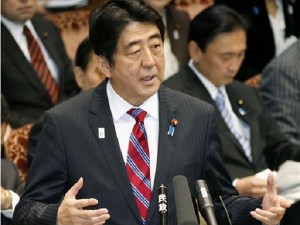US lawmakers warn Japan PM on ‘comfort women’
WASHINGTON—Two US lawmakers on Wednesday warned Prime Minister Shinzo Abe not to revise Japan’s apology over sexual enslavement in World War II, saying the move would set back relations between the allies.
The lawmakers raised the issue two days before a White House visit by the conservative Japanese premier, whose previous period in office was dogged by historical issues but who is now seen as increasingly pragmatic.
Representative Mike Honda, who spearheaded a 2007 House resolution that took Japan to task for holding wartime sex slaves, and Representative Steve Israel voiced “serious concern” about the Abe government’s stance.
In a letter, the two Democratic lawmakers wrote that if Japan revises a 1993 apology it “would have grave implications for the US-Japanese relationship and could ignite unnecessary tension and provocation with neighboring countries.”
Historians say about 200,000 “comfort women” from Korea, China, the Philippines and elsewhere were drafted into Japanese army brothels. The legacy remains a particular sore point in Japan’s relations with South Korea.
Article continues after this advertisementIn the 1993 statement, Japan offered “sincere apologies” for the “immeasurable pain and suffering” inflicted on comfort women. Two years later, Japan issued a broader apology expressing “deep remorse” for war suffering.
Article continues after this advertisementAbe, whose grandfather was a World War II cabinet minister, raised controversy during his 2006 to 2007 premiership for his statements on comfort women and after leaving office he called for a revision of the apology.
The 1993 apology is passionately opposed by some conservatives who contend that Japan did not directly coerce the women.
Since returning to office in December, Abe said that he plans a new “future-oriented” statement on World War II.
He has declined comment on the comfort women apology, suggesting it was not under his purview as it was issued not by a prime minister but by Yohei Kono, then the chief cabinet secretary.
Honda, who was interned during World War II due to his Japanese ancestry, said that aging former comfort women were “still waiting for an appropriate apology” from Japan.
“Government is a living, breathing organism that is responsible for its past, present and future,” Honda said.
“As someone who was put into an internment camp as an infant during World War II, I know reconciliation through government actions, to admit error, are the only ones likely to be long lasting,” he said.
